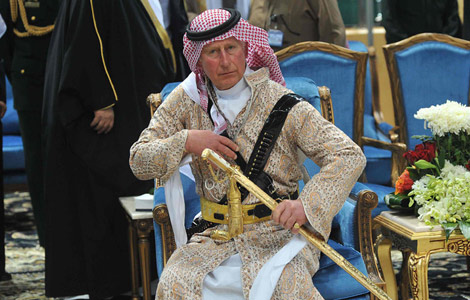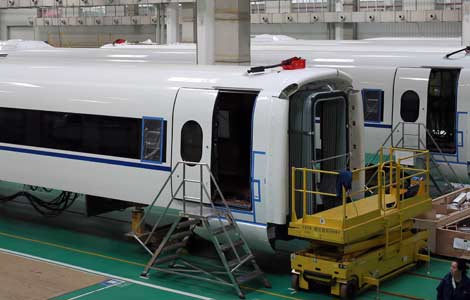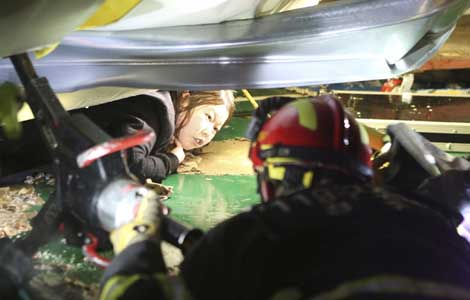China's aviation school banks on global ties
Updated: 2014-02-19 07:03
By Zhao Lei (China Daily)
|
||||||||
China wants to work more closely with European nations in training civil aviation engineers, an aviation educator said on Tuesday.
"A top aviation industry needs a pool of top talent, and this must be based on a top training system," said Wu Tongshui, president of the Civil Aviation University of China. "We plan to gain the capability of training the best engineers in major aviation fields before 2018, and in order to do that we must deepen international cooperation to improve how we teach."
Wu made his remarks during the graduation ceremony of 75 Chinese students of the Sino-European Institute of Aviation Engineering in Tianjin established by the Civil Aviation University of China. Each received a master's degree in aviation engineering.
Founded in 2007, the institute is the only school on the Chinese mainland that sends aviation engineers to foreign nations on exchange programs. Each year, it recruits around 100 Chinese students from the university and sends the top students, nearly 10 percent, to French aeronautical universities.
Wu said the institute will soon begin accepting 50 more students each year with possible increases in enrollment on an annual basis.
The Civil Aviation University of China is currently looking into expanding cooperation with French aeronautical universities to help train Chinese doctoral students. Wu said France is an ideal partner because it has the most successful training schools for engineers in Europe.

"The experience of Airbus is a good example. Compared to Boeing, the European company started very late but now is a strong competitor to the American giant," Wu said.
"The rise of Airbus came because of its powerful training system, which emphasizes practical engineering expertise and giving trainees many opportunities to intern."
Wu said more than 1,000 first-year students in his university apply each year for a place in the institute, which receives major sponsorship from Airbus. The 100 students are admitted after undergoing several rounds of written tests and interviews from Chinese and French teachers.
Other nations in Europe, such as Germany, have also sent teachers to the institute.
Zhu Ruixin, deputy director of publicity at the Civil Aviation University of China, said students at the university need six and a half years to receive their civil aviation engineering degrees.
During that time, about one-third of the students fail a number of stringent tests and are moved to other majors.
The university has agreements with 35 aviation companies in China, France and Canada to give students internship opportunities, said Wu, who added that many of its graduates have received offers from Chinese civil aviation authorities, airlines and foreign aviation companies.
In her speech at the ceremony, French Ambassador to China Sylvie Bermann said: "These graduates have a good command of aeronautical knowledge and practical engineering skills. They know the Chinese and French cultures very well. Therefore their service will definitely boost the development of the aviation industry in both nations."
Marc Houalla, director of the French Civil Aviation University, one of the three French aerospace universities working with the Chinese aviation university at the institute, echoed Bermann's sentiment.
"Our two countries share a long history of cooperation in many aviation fields. We hope that this cooperation will be expanded to more fields," he said.
(China Daily 02/19/2014 page4)

 Spirit of adventure lives on in Antarctic
Spirit of adventure lives on in Antarctic
 Prince Charles dances in traditional Saudi dress
Prince Charles dances in traditional Saudi dress
 Maglev trains speeding toward greener future
Maglev trains speeding toward greener future
 Building collapse at Korean resort kills 10
Building collapse at Korean resort kills 10
 The big ballet stage
The big ballet stage
 17 more cement plants biting the dust
17 more cement plants biting the dust
 World's largest freshwater lake frozen
World's largest freshwater lake frozen
 American photographer wins World Press Photo 2013
American photographer wins World Press Photo 2013
Most Viewed
Editor's Picks

|

|

|

|

|

|
Today's Top News
Reforms to put safety first for low-level flights
PLA soldiers bigger, need new gear
China's aviation school banks on global ties
Green timber preferred overseas but not locally
NHK head regrets history words
Police to root out organizers of prostitution
Li to officials: Move ahead with improvements
'Equal' talks open to Taipei
US Weekly

|

|




